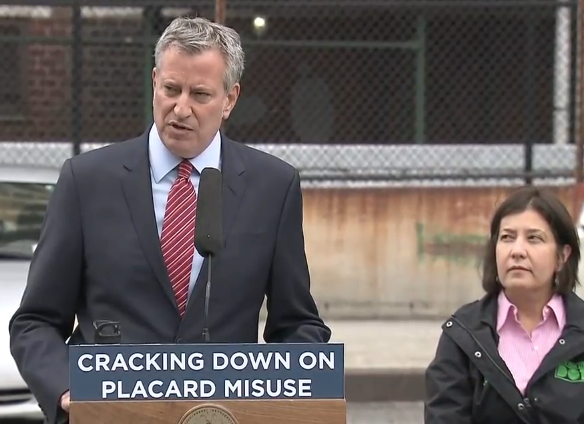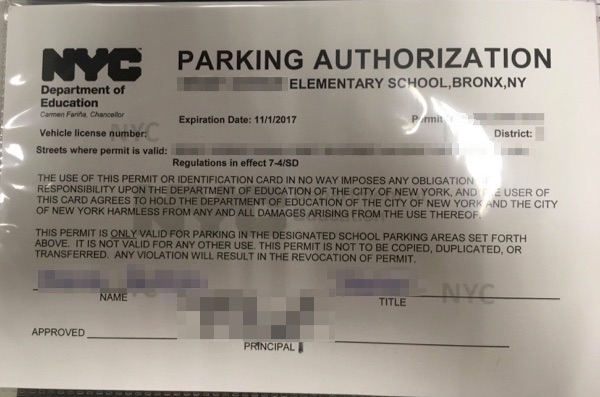Mayor de Blasio announced plans today to "crack down" on rampant parking placard abuse, one week after his administration granted tens of thousands of new placards to school employees.
"There's two things we have to be careful about," de Blasio told reporters. "A parking permit that is issued legitimately, but then used inappropriately. And secondly, an illegitimate parking permit -- one that's not authentic."
There are more than 100,000 official parking placards in circulation and an untold number of fraudulent ones. Placard abuse and fraud have been problems for a long time, most recently documented by the anonymous @placardabuse Twitter account, which posts pictures of vehicles with a variety of legit and fake placards illegally parked on sidewalks, in front of curb ramps, and in bike lanes, bus stops, and left turn lanes.
Placard holders break the rules because they know they can get away with it. The sight of a placard or placard-like item on the dashboard intimidates traffic agents -- who often have reason to fear reprisals from people higher up -- into letting illegal parking slide.
The mayor says that permissiveness is over. "I was troubled to hear of this website that showed footage of enforcement agents not doing their job," de Blasio said today, apparently in reference to the @placardabuse account, whose visual evidence has been cited by NY1's Errol Louis and others. He promised increased enforcement and "real consequences for anyone that abuses a placard."
“You better get to know where our impound lots are," de Blasio warned violators. “Use it the right way, or you will be caught, and there will be consequences.”
NYPD plans to hire 100 more traffic agents to ticket violators and assign 16 police officers to a "placard fraud enforcement unit." The city will also increase towing capacity and create new fines and penalties for both placard fraud and placard abuse. So the crackdown will rely on an agency with its own internal culture of placard abuse to enforce the law.
De Blasio also committed to "laying groundwork" for technology-based fixes -- namely, license-plate readers that can easily scan vehicles on a block to check for abuse. He did not offer a timeline for implementing any new technology, however.
In the meantime, the city will monitor 311 complaints, @placardabuse (someone pay this hero), and other online forums for "information we can use" in enforcement, the mayor said.
De Blasio's announcement comes on the heels of City Hall's decision to distribute 50,000 new parking placards to Department of Education employees, reversing a Bloomberg-era reform.
Today he defended the move, arguing that it was a necessary step the city had to take as a result of litigation with its principals' union. The DOE will create an office responsible for issuing new placards each year, he said, and the placards would only be authorized for use during school hours and in DOE-designated parking spots.
The 50,000 new DOE placards will bring the total number of city-issued placards to 148,516, de Blasio said. Both he and schools chancellor Carmine Fariña conceded that an influx of new placards will lead to more congestion, but de Blasio argued, not for the first time, that the effect will wane once teachers realize there's still the same finite number of parking spots.
"We think, [congestion] will, in the end, level off," he told reporters.
De Blasio appears to believe that complaints about placard abuse are coming from irate drivers competing for street space, not people walking and biking around cars cluttering the streets. "For many years as a driver, I experienced the challenge of finding a parking spot in my own neighborhood," he told reporters. "Parking is one of the biggest quality of life concerns of all New Yorkers... There's tremendous frustration when people feel that a parking space should be for the general public, and [it] isn't."
A placard system with enforcement is better than one without, but the simplest solution would be to abolish the placard system altogether. Placards are a huge, government-sanctioned incentive to drive into the most congested parts of town, and they help explain why public employees in Manhattan car commute at twice the rate of their private sector counterparts. Instead of putting our trust in a complex new enforcement regime, which will almost certainly lose momentum over time, a city without parking placards would be fairer for everyone.







